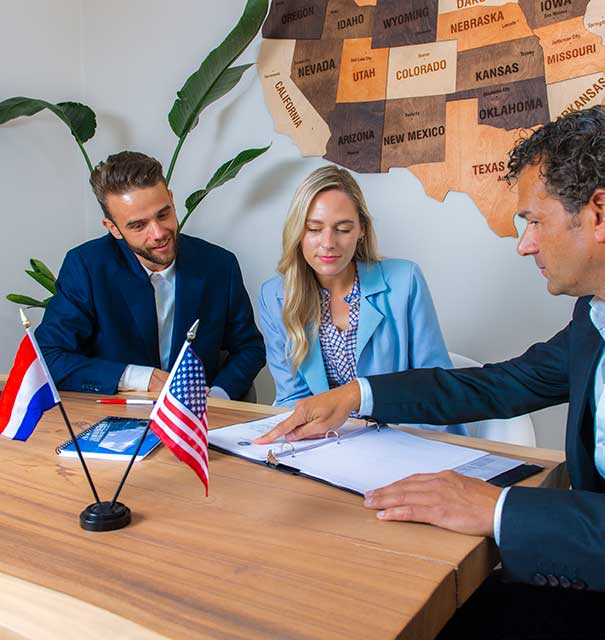
To address a common misconception right away: Unless you plan on starting the next Google or attracting millions in investments, a Delaware LLC or Inc isn't particularly beneficial. It's much more logical to consider where your customers are located and in which state.
Every day, dozens of entrepreneurs in Europe search on Google for terms like "Establishing an Inc," "Inc or LLC," or "What entities are possible in the US?" Fortunately, you've landed on this page. But how exactly does incorporation work? And what is the best course of action for your situation and your business?
What works best for your business in the USA? We can explain that to you in a personal consultation. This page provides information and general tips to consider before opening your own Inc. in the USA.
If you used to go to the Chamber of Commerce to register in the trade register, it would often result in a "Sole Proprietorship." If you ask an accountant in Europe whether a Sole Proprietorship, General Partnership, or any other entity is best, the accountant will crunch the numbers and come back with a complete calculation. Which is more cost-effective, and with which legal form do you pay more or slightly less tax? It's similar in the USA. Depending on whom you ask, you'll get a different answer.

If you pose the same question to an experienced entrepreneur, you'll almost invariably end up with "an Inc." And as the saying goes, "one Inc. is not an Inc," so a Holding Inc with one or more Operating Inc's beneath it is a familiar structure.
The structure of a company often involves a balance between tax structures on one hand and liability on the other. Perhaps you have a patent in one Inc. and a property in another.
We are all familiar with the tales of the cat in the microwave and the resulting multimillion-dollar compensation. Of course, there are many business transactions that do end well. However, you never know, as the U.S. has different laws and regulations.
Compensation claims can quickly escalate in the USA. This is often why an Inc. is a popular choice. The shares are held by a Blocker Entity in Europe, allowing you, in the worst-case scenario, to part ways with your U.S. entity.

Read more here about what exactly a buffer BV entails and what you can do to protect your new Inc from "cat-in-the-microwave" claims!
To register an Inc., beyond tailored consultancy, there are always a few basic steps you must take:
The options for establishing an Inc. in the U.S. can vary by state due to different regulations. We can assist you in all 50 states and provide guidance on making a good choice based on a personal consultation and information from your accountant, attorney, or advisor in Europe.

Ultimately, establishing your USA Inc. is all about tailored advice, and it goes beyond delving deeply into S-Corp, C-Corp, LLC, and LLP distinctions here. What's the probability of things going wrong? Can you shift some responsibilities to export agents or partners, for instance? Are the owners European or American, and what are the pros and cons of each? Where are you currently paying taxes? Are you producing a product that is part of the food chain, or is it a component for aircraft? These are all considerations that our experienced export lawyers and tax advisors can analyze to provide you with the best possible guidance.
Your choice of a specific business structure also relates to your product or service and how you plan to approach the market. Consider, for instance, the distribution channels in your particular industry or sector.
Of course, you'll also need an accountant in America. What taxes do you need to pay to the IRS, and how much? What local permits are required? The Van Holland Group is here to assist you with all these questions, from setting up your own Inc. to filing annual tax returns and everything in between and beyond.

All clients and customers of the Van Holland Group who have their own Inc. automatically become part of the "Advisory Board Network." This network comprises a team of legal experts, attorneys, accountants, and other entrepreneurs who have already taken the leap into the USA. This ensures we can always support you with guidance and assistance, and connect you with the right people when needed.
What exactly is it? Corporation, Incorporation, or Inc? All are correct. Your company is the corporation, often also referred to as a C-Corp. The process of forming a company is called incorporation. Once the Inc. is established, you're "incorporated" and can use Inc. after your company name. In practice, these terms can sometimes blur together, and translating from English to other languages isn't always smooth. But it should be: Van Holland Group Inc. or Van Holland Group Incorporated.
If you want to establish an Inc., contact us because we understand what you mean.
Open a flexible location and expand your business from economically favorable states.
If you are ready to make positive changes.
While it's not exactly the same, an INC is somewhat similar to a BV or GMBH.
We are more than happy to provide a customized quote for your business.
The Van Holland Group supports you with strategic planning, clear goals, and milestones for entering the U.S. market. Discover our straightforward approach. All prices are transparent and listed online. As an entrepreneur, you want to know exactly what to expect from the start
